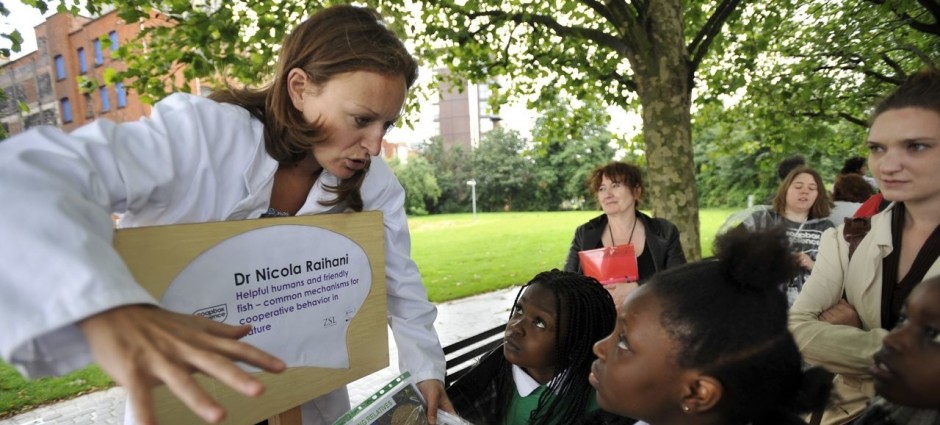 Sarah Bohndiek is a research group leader at the University of Cambridge. She is a physicist working at the interface with biomedical sciences, trying to improve our understanding of cancer and increase early detection of the disease. Sarah is also an enthusiastic teacher and mentor, STEM ambassador and science communicator. You can learn more about her research interests via her recent YouTube video. Sarah will be “Shining a light on cancer” in Cambridge Market Square on 2nd July 2016 12-3pm. Come along and be enlightened about detecting cancer!
Sarah Bohndiek is a research group leader at the University of Cambridge. She is a physicist working at the interface with biomedical sciences, trying to improve our understanding of cancer and increase early detection of the disease. Sarah is also an enthusiastic teacher and mentor, STEM ambassador and science communicator. You can learn more about her research interests via her recent YouTube video. Sarah will be “Shining a light on cancer” in Cambridge Market Square on 2nd July 2016 12-3pm. Come along and be enlightened about detecting cancer!
SS: Sarah, how did you get to your current position?
SB: Following an undergraduate degree in Physics at Cambridge, I joined the Department of Medical Physics and Bioengineering at University College London for my PhD. Here, I was able to combine my love of physics with my interest in medicine by developing novel methods for breast cancer diagnosis. Over the course of my PhD, which focused mostly on the optical and X-ray characterization of imaging sensors, I became more curious about the underlying biology of cancer as a disease. To gain a greater insight, I spent my postdoctoral research in Departments of Biochemistry and Radiology, working with specialists in cancer metabolism and molecular imaging. I am incredibly grateful to these biochemists, biologists and clinicians who taught me how to develop an experimental research programme in the biomedical sciences.
Armed with this broad experience, I had already begun to formulate my own research programme as a postdoctoral fellow. Over the past 2.5 years, I have built up a research team as an independent group leader, with laboratories based in the Department of Physics and also at the Cancer Research UK Cambridge Institute at the University of Cambridge. We bridge the gap between the physics and engineering of new imaging technology and the biological validation needed to translate these approaches for application in patients.
SS: What, or who, inspired you to get a career in science?
SB: I grew up in Greenwich, in south east London, close to the Meridian Line; the start of Greenwich Mean Time. Visiting the Royal Observatory as a child I became fascinated with the expanse of the universe and spent much of my time looking up at the stars. My parents encouraged me to pursue this hobby by funding my collection of popular (and not so popular) science books so by my early teenage years I was hooked.
SS: What is the most fascinating aspect of your research/work?
SB: I love the fact that I am able to interact with clinicians, whose first priority is their patients. The passion that they exude for saving lives is truly inspirational. I am also a geek and am motivated to find and develop new technologies. I always want the latest gadget!
SS: What attracted you to Soapbox Science in the first place?
SB: I derive great pleasure and inspiration from interacting with my team, which is incredibly diverse, not only in scientific training, but also in gender, nationality and culture. Bringing together a broad range of perspectives is essential for creative science, especially at interdisciplinary interfaces. As a result, one of my passions is scientific outreach. I hope that by standing as a role model for women in science and those whose families do not have a history of university education, I will contribute to eroding traditional barriers into studying science and pursuing a career in research.
SS: Sum up in one word your expectations for the day – excitement? Fear? Thrill? Anticipation?
SB: Nervous: this is a completely new kind of forum for me, which makes it exciting but also rather scary!
SS: If you could change one thing about the scientific culture right now, what would it be?
SB: In my view, current culture of science lacks an integral responsibility for public outreach. There are many facets to the public understanding of science, starting from education in schools through to media representation and visibility of leading scientists, but one part of the challenge is with the scientific culture itself. I believe we as scientists have a responsibility to share our knowledge and explain our research to the public, who after all, are funding our endeavours through taxes and charitable contributions. In my view, this should be an integral part of our mission as scientists.
SS: What would be your top recommendation to a female PhD student considering pursuing a career in academia?
SB: I personally do not feel female PhD students need specific recommendations as the challenges of a PhD apply equally to men and women.
Why pursue a career in academia? I wake up every morning excited to go to work, never knowing exactly what the day will hold and certainly never doing the same thing twice. The academic career is for the curious and the passionate. Success requires incredible self motivation, integrity and determination. But if you are excited by science and see those qualities in yourself, then have the positive ‘can do’ attitude and confidence to pursue your goal.
My top recommendation would be to take advantage of conferences to network globally and create opportunities to work overseas. Experiencing different scientific cultures broadens your horizons and strengthens your experience as a scientist.
